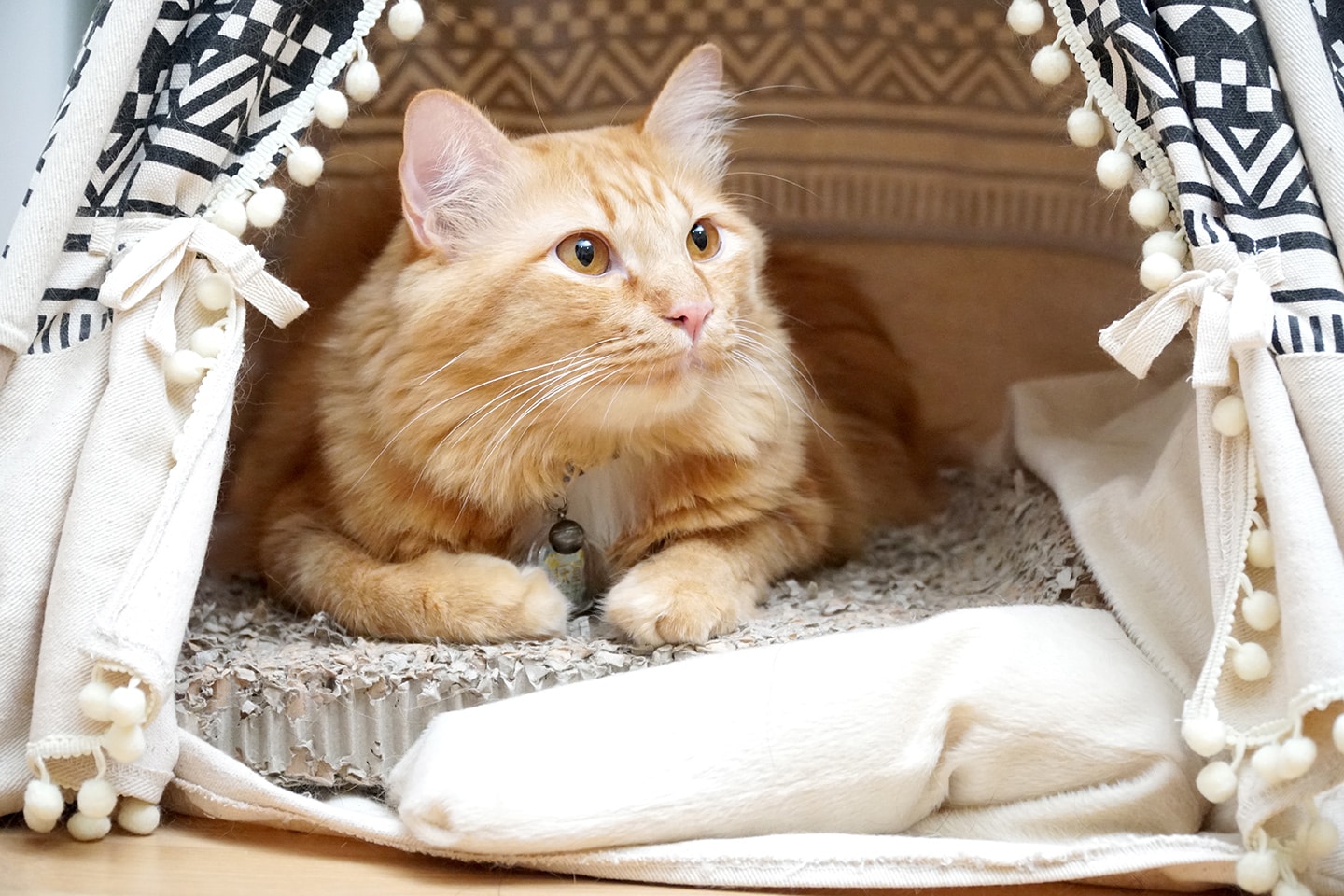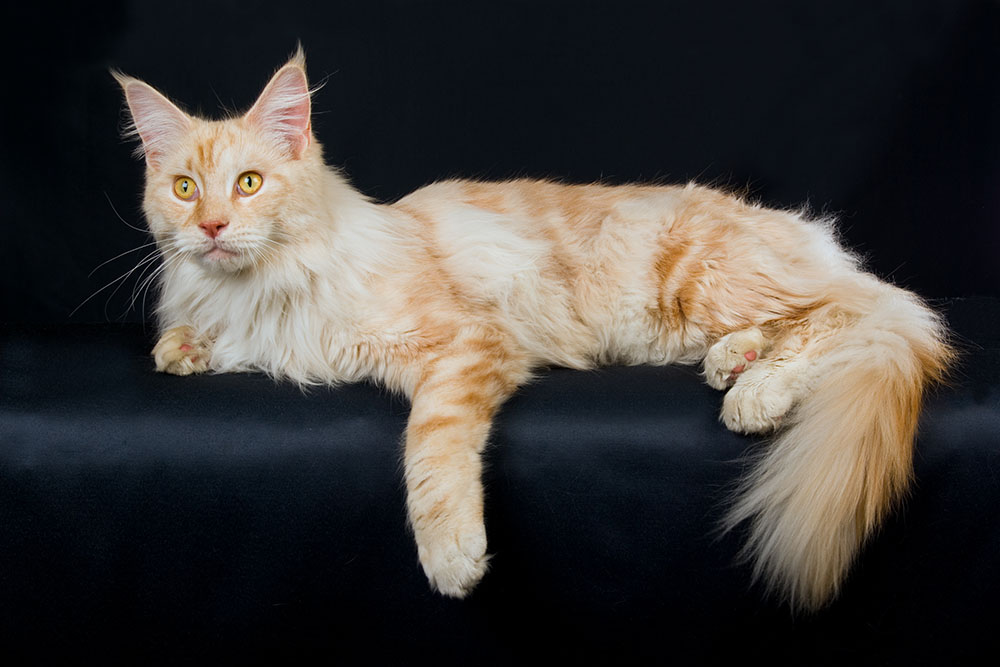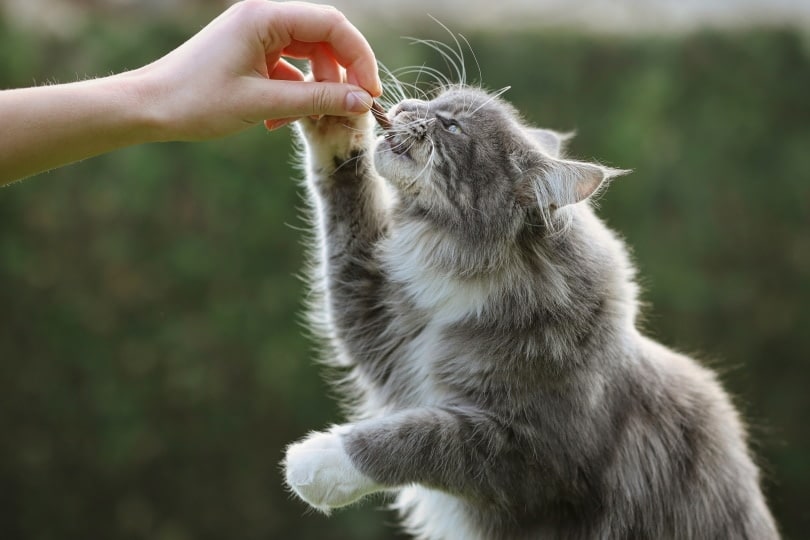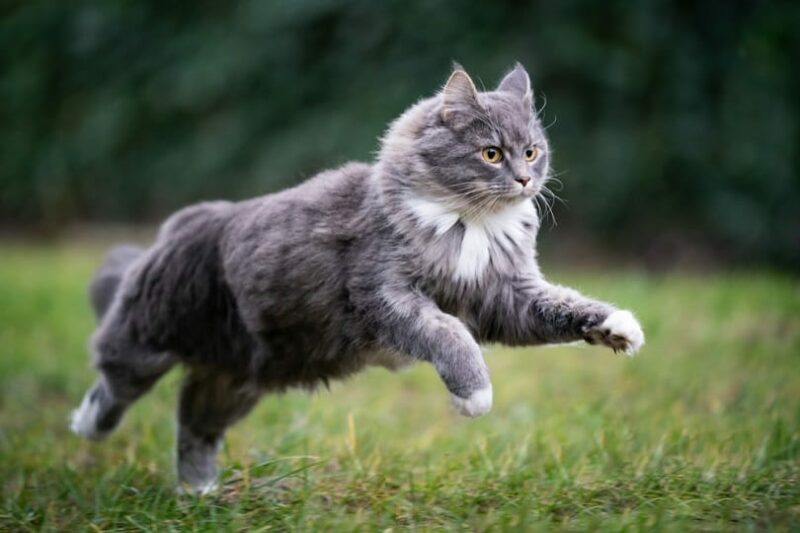The Maine Coon cat is a stunning breed that is adored for many reasons. Unfortunately, they are not a suitable breed to select if you are an allergy sufferer. These cats are not hypoallergenic, and their long fur is likely to trigger those who suffer from allergies.
To find out more about Maine Coon cats and why they are not hypoallergenic, keep reading. This article tells you all about hypoallergenic cats, Maine Coon Cat allergens, and how to live with a Maine Coon with allergies.
Hypoallergenic Cats Meaning
Hypoallergenic is a term that can describe earrings, skincare products, or pets. Hypoallergenic simply means that the animal is less likely to trigger an allergic response when it comes to pets. The reason for this is that the animal has fewer potentially irritating substances than other animals.
It is essential to mention that there is no such thing as a 100% hypoallergenic cat. All cats have a chance of triggering allergies. Some breeds are simply less likely to trigger allergies than others. The reason for this is due to what causes an allergic reaction from animals, including cats.

Maine Coon Allergies
Even though many people assume that it is the animal’s fur causing the allergic reaction, it is proteins in the animal’s skin, urine, and saliva. The protein sticks to the fur whenever it sheds, making animals that shed more likely to trigger allergic reactions.
What makes one animal more hypoallergenic than another is its likelihood of having flaky skin. Long fur and certain skin conditions make it more likely for an animal to trigger an allergic reaction. For this reason, hypoallergenic animals typically have short fur, don’t shed often, and don’t drool a lot.
Cats shed quite a bit, and they often have dry and flaky skin. This is why cats tend to trigger more allergic reactions than dogs. Their skin simply flakes off more frequently, exposing you to the protein allergen.
Additionally, the fact that the protein is found in the skin is why no animal is 100% hypoallergenic. All animals have skin. Thus, they have a chance of triggering an allergic reaction. Some animals, however, shed less frequently, meaning that they trigger fewer responses.
Are There Hypoallergenic Cats?
There are way fewer hypoallergenic cats than there are hypoallergenic dogs. Still, some cat breeds produce less of the protein allergen. The Siberian and Balinese breeds are some of the most popular hypoallergenic cats, but they are not the only ones. These hypoallergenic cats can still trigger allergies, which makes knowing how to manage cat allergies imperative.
- Bengal
- Cornish Rex
- Devon Rex
- Oriental
- Russian Blue
- Sphynx
Signs of Cat Allergies
Signs that you are having an allergic reaction to a cat are very similar to hay fever. Most often, people will experience the following symptoms, most of which are related to inflammation within the nasal passages:
- Cough
- Eczema
- Facial pressure/pain
- Frequent awakening
- Hives
- Itchy eyes
- Itchy nose
- Itchy roof of the mouth
- Itchy skin
- Itchy throat
- Nasal congestion
- Postnasal drip
- Red eyes
- Runny noses
- Skin under eyes swollen and blue-colored
- Sneezing
- Watery eyes
- Audible exhaling
- Difficult breathing
- Tightness or pain in the chest
- Trouble sleeping because of coughing, shortness of breath, or wheezing
When to See a Doctor
If you have cat allergies, it may be a great idea to see a doctor. A doctor may be able to recommend an over-the-counter or prescription-strength allergy medication. An allergy medication will not target the cause, but it will make the symptoms more manageable.
You should especially see a doctor if the allergies are triggering any severe reactions, such as asthma. Call your doctor immediately if you are having difficulty breathing, tightness in your chest, or shortness of breath.
Are Maine Coons Hypoallergenic?
Maine Coon cats are a loved breed, but they are not known for being hypoallergenic. Like many other cat breeds, Maine Coons are not hypoallergenic. If you have frequent cat allergies, it is best to go with a different cat breed because Maine Coon cats are likely to trigger allergies.
At the same time, Maine Coon cats are not the worst breed to get if you suffer from mild allergies. Because Maine Coons have such thick fur, their dander is more difficult to spread past the cat’s fur. As a result, this breed is more hypoallergenic than some shorter fur varieties.
More so, females are more hypoallergenic than males since they produce less of the protein allergen than males. If you only suffer from mild allergies, you may be able to tolerate a female Maine Coon with over-the-counter allergy medication.
Why Aren’t Maine Coons Hypoallergenic?
Maine Coon cats are not hypoallergenic because they have thick fur that sheds a lot throughout the year. Whenever the fur sheds, the Coon’s dander sticks to the hair. This causes allergy sufferers to experience severe allergies, especially during the shedding season.
Additionally, Maine Coon saliva comes with that protein allergen as well. Any time the Maine Coon licks you, your skin may have an allergic reaction in response. More so, any time the Maine Coon licks a surface, the protein can dry and spread into the environment, triggering respiratory responses.
What If I Still Want a Maine Coon?
Just because Maine Coons are not hypoallergenic does not mean you can’t get one if you are an allergy sufferer. In fact, many people are able to live happily along with their Maine Coon, despite their cat allergies.
As we already mentioned above, Maine Coons are not the worst breed for allergies, and the females will be much more hypoallergenic than the males. Making sure you find a female Maine Coon can go a long way toward minimizing your allergies. Plus, going the extra steps to maintain your Maine Coon and your home will make the symptoms that much more manageable.

7 Ways to Minimize Cat Allergies
There are other ways to minimize cat allergies. Taking extra care of your Maine Coon can help reduce the spread of the cat dander, making it more friendly for allergy sufferers.
Brush & Bathe Your Cat Regularly
Make sure to brush and bathe your cat regularly. Brushing your cat will remove excess dander from the fur before it has a chance to spread around your home. Similarly, bathing your cat removes excess protein from the cat’s body. Even though most cats hate being washed, Maine Coon cats love the water, making this an effective option for this breed.
Wash Your Hands After Petting the Cat
Additionally, wash your hands after you pet or brush your cat. Every time you touch your cat, the protein from their body sticks to your hand. Simply taking a few minutes to wash your hands will minimize allergens and spread of the protein.
Minimize How Often You Touch Your Cat
If you can help it, try to minimize how often you touch your cat. Once again, every time you touch your cat, the protein sticks to your hands. Not petting your Maine Coon, or minimizing how much you pet them, will make a big difference.
Don’t Let Your Cat Lick You
The protein allergen that triggers allergic reactions is found in cat saliva. Do not let your cat lick you. Many people find that the protein in the saliva creates rashes and other unwanted reactions.

Clean Your Home
If you have a cat, you probably do this already, but make sure to clean your home well. Cleaning your home regularly removes the cat allergens that are attached to the surfaces throughout the home. Part of cleaning your home includes keeping the air clean. Change out your air filter frequently since pets dirty up the filter very quickly. Use a HEPA air filter specifically.
Set Limits in Your House
Instead of letting your Maine Coon free roam your entire house, set limits about where they can go. Train your cat not to enter certain rooms, such as bedrooms or any other room that you especially don’t want the protein allergen to be in. Doing so will minimize allergies by minimizing the allergen exposure.
Talk to Your Doctor
Medications help you manage the symptoms of allergic reactions. There are tons of over-the-counter allergy medications you can select. If over-the-counter options are not strong enough, you can also talk to your doctor about selecting a prescription-strength allergy medication.
Final Thoughts
Unfortunately, Maine Coon cats are not hypoallergenic, but there are ways you can minimize your allergic reactions. Given that all cats produce the protein allergen, it’s a good idea to learn about minimizing allergic reactions, regardless of whether you select a Maine Coon breed.
By spending extra time grooming your cat, cleaning your house, and taking allergy medication, even allergy sufferers can live happily among a stunning Maine Coon.
Featured Image Credit: Nils Jacobi, Shutterstock
Contents
- Hypoallergenic Cats Meaning
- Maine Coon Allergies
- Are Maine Coons Hypoallergenic?
- 7 Ways to Minimize Cat Allergies
- Brush & Bathe Your Cat Regularly
- Wash Your Hands After Petting the Cat
- Minimize How Often You Touch Your Cat
- Don’t Let Your Cat Lick You
- Clean Your Home
- Set Limits in Your House
- Talk to Your Doctor
- Final Thoughts














